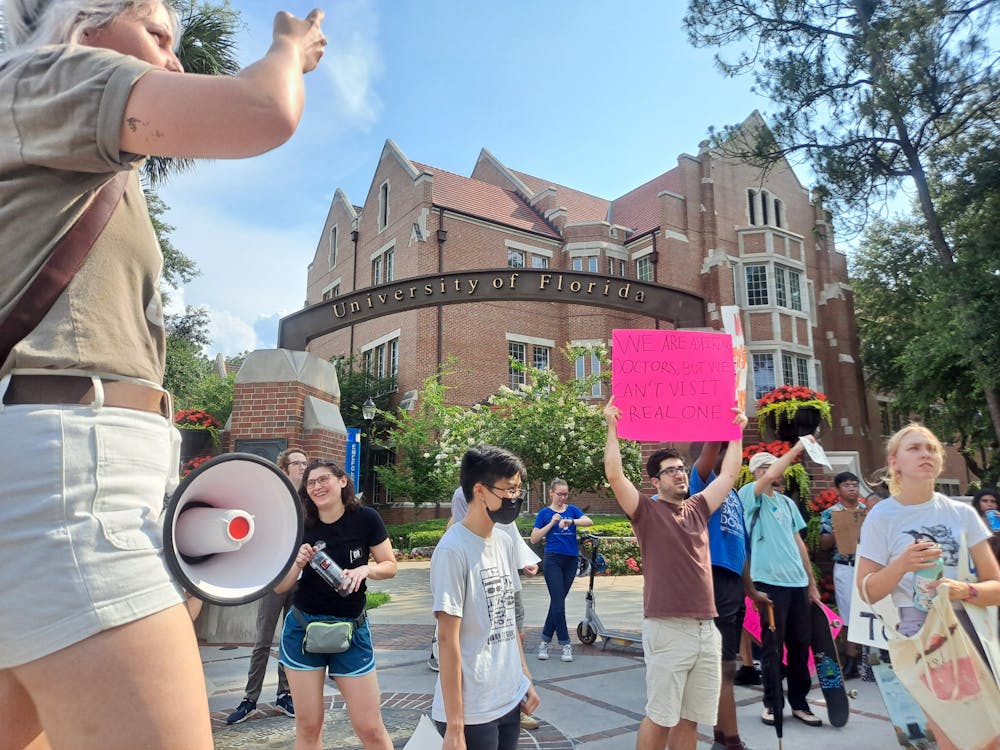When Mikayla Darrows heard her stipend package had been increased for the first time in five years, the 24-year-old UF chemistry doctorate student said there was no cause for celebration.
She lives in a temporary housing situation, and the monthly paycheck she receives as a graduate assistant is less than her rent. Darrows’ program doesn’t allow her to seek outside employment.
“I’m doing all this work and I come home to an empty fridge,” Darrows said.
UF Graduate Assistants United announced its agreement with the university Thursday regarding a final minimum stipend offer, which is the equivalent of a yearly salary that some graduate assistants depend on for their main source of income.
However, GAU’s leadership claims the increase still isn’t enough to keep the lights on for many graduate assistants.
Negotiations have been ongoing since last September. UF and GAU agreed on a $17,000 stipend minimum for graduate assistants working nine months out of the year, and around a $22,753 minimum for those working full time, which is $1,896 monthly.
In early stages of the negotiations, the UF team offered a one-time raise of a little more than $1,000 in exchange for the elimination of transportation and health fee relief — which GAU secured for its graduate assistants in August 2021.
As well as the minimum stipend increase, the final package includes the promise of no elimination of fee relief, as well as a 3% wage raise for all graduate assistants.
In return for the elimination, GAU Co-President Bryn Taylor said this is the most expensive package the organization has secured since it was founded in 1972.
Darrows, GAU’s communications co-chair, attested to her personal financial situation multiple times during the first bargaining sessions in Fall 2021.
Darrows was on the verge of quitting graduate school before the negotiations started, she said. Now, even with the raise, she said she’s still in a tough position.
“It’s just too expensive,” she said. “It re-enforces the idea that a UF PhD is only for rich people.”
Darrows grew up below the poverty line, she said. She did well with her first-year stipend before inflation began to make rent and groceries difficult to afford. Now she gets all her meals from food pantries.
Darrows pays a friend $500 a month for a room in a house. The house is on the market, and Darrows said that she can’t afford anywhere else to live once her friend sells it.
“The new stipend still doesn’t cover my monthly rent,” she said. “It doesn’t cover my monthly bills. It still feels like we’re stuck.”
Originally, GAU had been looking for a $29,125 minimum for graduates working nine months out of the year and a $38,333 minimum for full-time employees. There were three counteroffers from UF that held to the $17,000 and $22,753 minimums, but added the raise.
Taylor said the $38,333 offer was an attempt to keep most graduate assistants out of rent burden, which is when someone pays 30% or more of their income toward rent.
When negotiations started, GAU’s primary argument for an increase was the higher cost of living in Gainesville and how it compared to the stipend at the time, which was about $21,333. The group referenced the Massachusetts Institute of Technology living wage calculator, which estimated $34,069 as the minimum required income in Alachua County for a person living alone.
GAU used this number as a reference for its offers. However, the agreed upon stipend for full-time students ended up being about 25% less than the MIT estimate — and nearly 40% less than the original offer of $38,333.
The original stipend of $21,333, established in 2017, is now worth around $26,000, considering inflation rates, according to Taylor. This means that an increase to $22,753 is still a pay cut and doesn’t catch up to the current economy, she said.
Like Darrows’, some UF graduate programs don’t allow graduate assistants to seek outside employment, meaning sometimes their only source of income can be the stipend.
“UF loves to call us employees when it’s convenient,” Taylor said. “But the reality is that some of us have families to provide for. We’re professionals, and we deserve to be treated that way.”
The push for the minimum stipend increase comes from a GAU change in leadership, Taylor said.
Taylor and Rachel Hartnett are the co-presidents of GAU. Taylor was elected last May, and Hartnett was elected in 2021.
“We’re both new,” Taylor said. “Which means we’re both open to going out on a limb here to try new things.”
Negotiations took place over Zoom. Ryan Fuller, vice president of the UF General Counsel Office, took the lead during the meetings for the UF negotiations team.
The Alligator asked Fuller via email for comment on the situation, but the request was declined by UF spokesperson Cynthia Roldan.
There were 11 posted public bargaining sessions online over the course of 2021 and 2022. A few of the meetings had more than 100 graduate student attendees, and some were given a chance to speak on their own financial experiences as UF graduate students.
GAU decided to accept UF’s fifth counteroffer to provide a starting place for new negotiations. The bigger the starting number, the less ground they have to cover, Taylor said.
Taylor said the organization intends to open up negotiations sometime in October to push for an even higher stipend minimum than they agreed on this past week.
Opening up negotiations again would be the alternative to the union declaring an “impasse” where GAU and UF would then put negotiations in the hands of the state government, Taylor said. It would choose a mediator who would then decide on what offer was fair.
Taylor said they would be unlikely to get a higher minimum through that route.
“We fully intend on getting to that living wage,” Taylor said.
Contact Siena at sduncan@alligator.org. Follow her on Twitter @SienaDuncan.

Siena Duncan is the Fall 2024 Editor-in-Chief of the Alligator. She's interned for the Salt Lake Tribune, the Tampa Bay Times and POLITICO. In her spare time, she loves to take walks to see the cows by her apartment and add more to her sketchbook.






